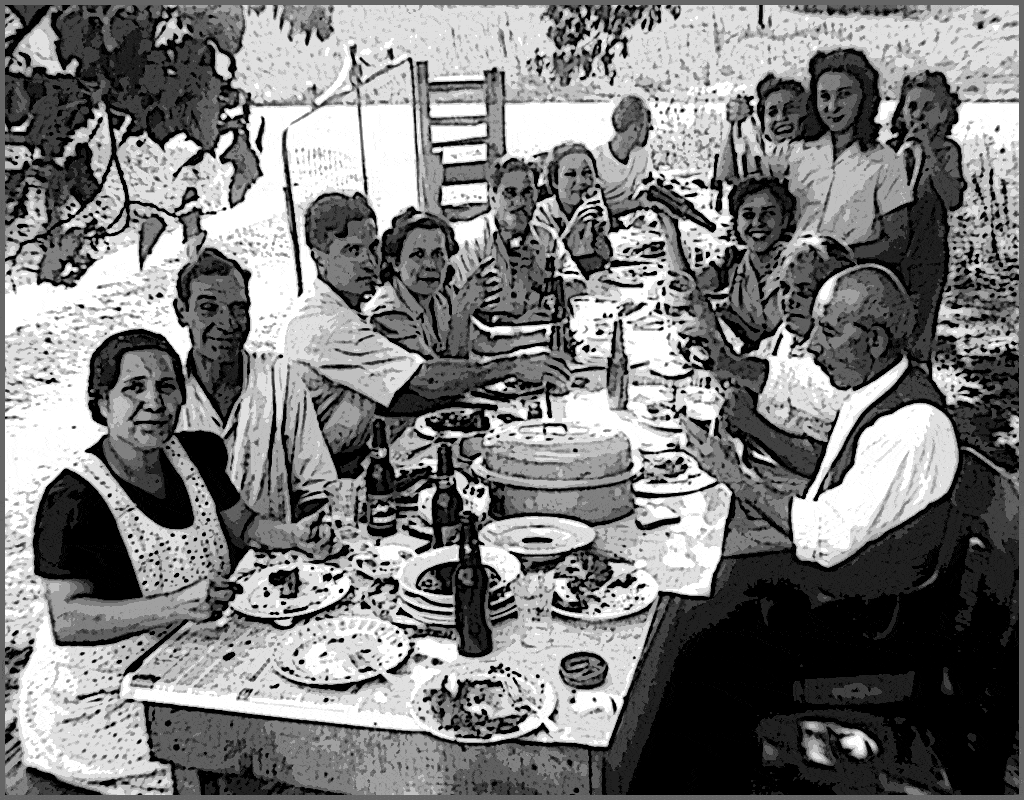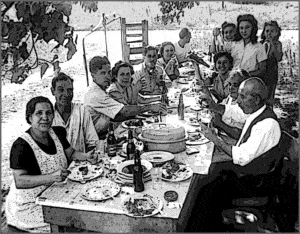Whenever I get together with my favorite cousin and the bourbon begins to flow, and we begin to reminisce about the family elders, one of us will inevitably say, “What about (fill in the blank with anything)?” The other will immediately retort, “What about (fill in the blank), … What about Cheech?” My cousin and I immediately break into wild laughter at the reference, while others in the room simply stare curiously.
“What About Cheech?”, refers to a story about my Uncle Cheech. Uncle Cheech lived his whole life in a small, rural town in western Pennsylvania, called Brockway. He was a devout Catholic and rarely traveled far from home. He was a self-made, very successful businessman in his early 70s. Above all, Cheech was very Italian. He was the elder of twelve children in a large extended Italian family.
When my younger brother announced his wedding date, Uncle Cheech decided to attend. The wedding was to take place in Atlanta, Georgia, a thirteen-hour drive from Brockway. Coincidentally Cheech’ son, Mike, also lived in Atlanta. Cheech could attend the wedding and stay with Mike.
The week of the wedding, Cheech arrived at Mike’s house and settled in. Mike, Mike’s wife Peg, and their two young children welcomed Cheech into their modern home and endeavored to show Cheech Atlanta. After a long day of sightseeing, the three adults and two young children arrived home, tired and very hungry. Mike and Peg immediately began to fret about what to feed the children. Peg matter-of-factly asked Mike, “What are we going to feed the kids? Should we order a pizza for the children?”
The next day, at the wedding, Cheech seemed agitated. I asked, “Why?” He related the story of the previous day’s events to me with an air of indignation. ”What about the kids?; … what about the kids?” Cheech exclaimed, “What about Cheech?” It then became clear to me that Cheech was vexed that Mike and Peg would consider what the children were going to eat before considering the family elder – Cheech.
The reason my cousin and I find this so funny is because, with regard to age, we’re in the perfect position to understand why Cheech feels this way. The Italians are traditionally very family centric, with the elders occupying the top positions of power in the extended family hierarchy. Consider the movie, “The Godfather.” Until Vito voluntarily “stepped down,” relinquishing the reins of power to Michael, he was the center of all family power. Every major decision had to be approved by “The Godfather” personally.
This behavior was not specific to this movie. When I and my cousin were young children, all the Italian families we knew were like this. Until the elders handed power off to the next generation, they were the center of power and attention at all family gatherings. At mealtime, the elders were always considered first. Children were an afterthought. At family gatherings, children usually didn’t get to sit at the “big table” with the adults. Children were taught to “know their place,” and that place was subordinate to the adults and elders. Children “spoke when spoken to” and were seldom, if ever, considered when planning meals. They ate what adults placed in front of them. Hunger was the main driver, not eating amusement. There was no snacking between meals.
But that was in the 1950s and 1960s. As the seventies and eighties rolled in, societal norms in the U.S. began to overtake even the most traditional Italian families. As children of Italian immigrants increasingly Americanized, they began incorporating American, “politically correct,” ideas into their extended families. One of those politically correct ideas that ran counter to Italian family values was the idea that children come first.
I believe this modern American norm sprouts from the guilt most Americans feel because both husband and wife work, and by necessity, subcontract the raising and training of their children to strangers in daycare centers. Because parents spend much less time raising their children, they tend to “overcompensate” during the time they do spend with them. Today, many working couples generally “dote” on their children and “enjoy” them rather than train them. They treat children more like cherished pets, rather than adults in training.
The old Italians had no compunction about subordinating youngsters to the periphery of family gatherings. I believe this is because, at that time, most families raised their own children. Mothers spent many hours feeding, dressing, teaching, bathing, and disciplining their children. They had no misgivings regarding the state of their children’s maturity and they certainly felt no anxiety banishing children to the backyard, basement, playroom, or children’s table during family gatherings. Because mothers knew first hand their offspring had no idea what was “good for them,” or what they should be “exposed to,” or what was in their “best interest,” they seldom considered children’s opinions. They rightly gave children what they felt was needed, not what the children wanted.
My cousin and I belong to a “lost generation.” As children, we were regarded by elders as subordinate. Now that we are the adults, we’re required to consider children first, or suffer the consequences of the “Political Correctness Police”. Consequently, we have never experienced a time when our wishes were regarded as “the most important.” As children, we were taught to respect and defer to elders, now as adults, we’re socially pressured to consider children’s wants and needs first.
The knowledge of this irony, coupled with the perspective that comes from spanning these two distinct social periods enables my cousin and me to completely understand Cheech’s frustration. Cheech realized, maybe for the first time, that he lost his position in the family hierarchy to two small children. My cousin and I laugh, at his frustration; a frustration we’ve knows for a long time. Maybe it’s worse to have had privilege and lost it than to have never have experienced it at all.






2 Responses
Your story about Uncle Cheech is spot on. You touch on every thing I witnessed, and experienced, as a youngster growing up in the 50s and 60s. Not only in my family but also my wife’s family who I met at 16 years old. I appreciated the respect that was required by the elders. Why not? They deserved it!
Gernude, Thanks for reading and commenting!